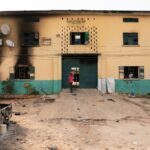Many were worried when Nigeria witnessed the fourth jailbreak in Jos, Plateau State, on November 28, 2021. Two hundred and sixty-two (262) inmates escaped in the incident. Earlier that year, on April 5, the Owerri Correctional Centre in Imo State was attacked. About 1,844 inmates got freed in the attack. 2021 also recorded an attack on the Medium Security Custodial Centre in Kabba, Kogi State, on September 12 where two hundred and forty (240) inmates escaped. On October 22, 2021, eight hundred and thirty-seven inmates and suspects awaiting trial also escaped at the Abolongo Correctional Centre in Oyo State when the correctional centre also suffered an attack. These attacks happened in just a year, with more than 3,000 inmates returning to society.
In 2022, the dimension of jailbreaks is changing. Two noteworthy personalities made the list of beneficiaries of the presidential pardon given to 159 convicts. These are two former governors serving sentences for corrupt practices. It is now great jollification for Jolly Nyame, former governor of Taraba State (1999-2007), who was serving a 12-year jail term for misappropriation of funds, as he will now jolly along with the same people he plunged into misery and suffering. Daringly, Joshua Dariye, the former governor of Plateau State (1999-2007) who also embezzled N2bn and was sentenced to 10 years in prison, is now free to walk as a free citizen.
- NFF hammers Ottasalo, Bayelsa Utd, others over infringement
- Bandits kill 4, abduct 15 villagers in Kaduna
Despite its acclaimed fight against corruption, the present government must have rightly thought that these people do not deserve to be behind bars because of the mindless looting that has occurred in Nigeria since they left the corridors of power. To the council of state which granted the pardon, it is a show of solidarity with one of them. This pardon is nothing but a good precedent for the current looters. It shows that there is a covert immunity for the present officeholders who may decide to loot public resources with impunity since there is the possibility of a presidential pardon in the future.
The pardon may force anyone to rationalize the previous jailbreaks. Or how do you explain a justice system where thousands of people are in prison for petty or minor issues, but the big thieves get pardoned? Is this a motivation to steal ‘big’ if you ever have the opportunity in Nigeria? Why will the vulnerable not be the priority if there is a need for a presidential pardon? Why will a government spend millions of taxpayers’ money to prosecute and convict thieves only to grant a presidential pardon after that?
Just as it is easy for these jailbreaks to occur without prior security and intelligence reports, it is also easy to get out of Nigerian prisons. Where a jailbreak does not happen, the government will pronounce a ‘political jailbreak’ that will set the prisoners free and qualify them to go into society and reorganize themselves to know the current methods to steal without being caught. They are leashed on society in a renewed dimension. This is a pointer to the fact that the anti-corruption campaign of this regime is only lip service. The action of the president will leave many questions unanswered. Is this act a justification for wrongdoing? Is it an excuse for the flawed methods of imperfect thieves? Is it a genuine act of pardoning wrongdoing?
More questions will be asked with the most recent attack at the Kuje Prison, Abuja, on 5 July 2022, where over 800 prisoners escaped. Will the escaped prisoners, alleged to be members of the Boko Haram insurgents, go to sleep? Of what use is the sacrifice of innocent soldiers who shed their blood to capture these terrorists?
Matthew Alugbin, Ph.D., writes from the University of Ibadan, Oyo State
 Join Daily Trust WhatsApp Community For Quick Access To News and Happenings Around You.
Join Daily Trust WhatsApp Community For Quick Access To News and Happenings Around You.


